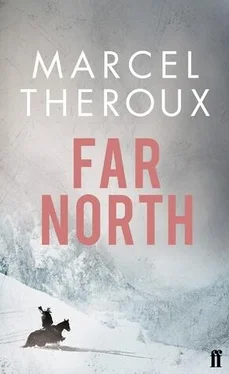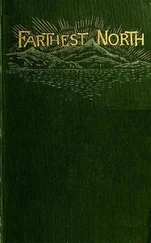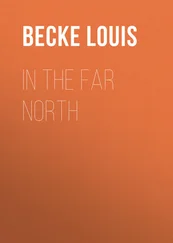Long past midnight the hailstorm ceased and the air grew quiet and fresh. I rattled on the door with my tin cup to get the guard, then I told him I had a message for Eben Callard.
IT TOOK THEM ANOTHER DAY and a half to distil ethanol for the plane’s spare tank. The plan was to take enough for two flights and miss out the base on the journey back.
They let me back to sleep in my old room and I was up at dawn, waiting by the plane in the caramel morning light as the horses were loaded up a ramp at the back.
The animals baulked at the stink of oil and spirit, but the guards shoved them in and fixed them in slings to hold them through the journey. I know in the old days that even the Tungus flew sometimes, and they moved their prize caribou by air. Then we took our places amongst them, some of us on boxes, others on the seats that swung down from worn latchings on each side of the plane. The inside was painted sky blue, with Russian words stencilled on it. I felt for all the world that I was in a shed. It didn’t seem possible that it would ever be able to leave the ground.
We were sat there for almost an hour before the props started turning, so I had plenty of time to think about what I had chosen. I felt that Shamsudin would have approved of the deal I’d struck. Civilization and cities are the same thing , he’d said. I wished he was coming with me. I wasn’t too old for a change.
Eben was the last to get in. He was helped up to a seat beside the pilot in the front of the plane and put on some headgear to talk to him with.
At the take-off, we rumbled across the grass outside the base so slowly I couldn’t see how we’d lift before we hit the trees. Then just when it seemed the pilot had misjudged the take-off, the note of the engine changed, and she rose up and an invisible weight pressed me into my seat.
The horses seemed more calm about the notion of flying than I was. They swayed a little as we lifted, but never stopped munching out of their feed-bags.
I had to turn awkwardly to look through the windows. I could see the ground dropping away beneath us as we turned in a wide arc over the base. It was spread out beneath us like a toy fort.
The men who were marching out to work all turned as one to look up. The bare ground around them was wn and faded like a worn bearskin. Summer and winter are the two moods of the north, but so different that you’d take them for different places.
And then we were over the taiga — one green vastness all the way to the horizon, here and there slashed with little rills of white water. The size of it made my neck prickle. At its distant edges I could make out the faint curve of the globe.
There was a roar in the cabin that was too loud to speak over, and some of the men dozed. The ones beside me were jumpy during the flight. They watched me carefully, not quite believing I would be helping them willingly.
It wouldn’t have been hard to grab hold of the steering and plunge all of us into the trees. But I was as good as my word.
*
It took us half a day to cover the same distance it had taken weeks to ride. Towards noon we got a signal from the cabin that we were passing over the Zone.
You had to see Polyn from the air to see what a masterpiece it was.
It lay bleaching in the sun underneath us, like the bits of a broken machine: streets fanning out from the hub of the main square, the river alongside it like a sheet of hammered lead, reflecting the sun back up at us with a dull glow, and that big head, no more than a bronze pimple.
The pilot brought us down on a stretch of flat ground by the riverside. We seemed to speed up as we landed, until the trees were rushing past us, and it felt like we would certainly crash, but the plane bounced a couple of times like a skimmed stone and then pulled up to a stop.
The sunlight was fierce as I climbed out. The props died gradually into silence until all you could hear was the boisterous sound of the insects. The mosquitoes plagued us from the moment we touched down. We wore head-nets to fend them off, but any bare skin they’d settle on in a moment, and gorge until you killed them, or until they flew off, fat and giddy with blood.
It took a while to unpack the plane. The horses had to come down the ramp again, and they took some cajoling. The men smoked constantly and they bickered and shouted, nervous about the place we were in.
We made camp a good way from the bridge because the pile of bodies was stinking.
It was a lot different from my last time there. They’d brought bedding, fresh food, and clean firewood from the base — not to keep warm, but for smoke to put off the insects.
The pilot slept in the plane that night, but the rest of them spent the night in the open, sleeping in shifts so there was always someone keeping one eye on the Tungus — and another on me. They still didn’t trust my change of heart.
*
Apofagato had told me I should shave my hair off as a safeguard — anything to stop dust leaving the Zone. So at first light I snipped it short with some clippers and finished it off with a razor.
The guards were asleep. Eben Callard had a private tent and two men to guard it. Like he’d said, he had to be careful how he did business.
I had some tools but no weapons to speak of and I knew there was nothing I could do to stop the double-cross. I just hoped if they’d decided to kill me, they’d do it quickly.
My hair lay all around me in mousy tufts. It was darker than I’d expected, but for the first time in my life I could see there was grey in it. I stroked my naked skull with my fingers — it felt queer and slick to the touch. It was a comfort to cradle it, somehow. It was warm and there was a pulse in it. It reminded me of Ping.
The last thing I did was to throw away the keepsake I had made from the wing. I’d been wearing it so long it left a smudge of grey on my skin. I took it off and pitched it into the river. It rose and dipped like a bird in flight, then vanished. I thought that whatever hopes and convictions she had cherished, Makepeace was just another mask that life wore as it fought to renew itself, unsentimental, unsparing, fighting ugly.
I didn’t doubt that Eben had told me the truth. Bill Evans had a rule of thumb he used to size up suspects. It wasn’t foolproof — what is? — but it helped to get a handle on people. He called it the law of opposites. He said the truth of a man is the opposite of what he wants you to know about him. If you want to understand someone, you have to find a way to catch hold of his shadow. By Bill’s reckoning, the man to fear is the one always harping on about goodness.
My father felt exalted by the thought of the things he had given up to live his life. He believed that he was a better man than those people who had clung on to riches and city life, who had been slower to see the changes in the world. But the truth was he wasn’t even as good a man as Eben Callard.
Eben was cruel and blunt and practical. He called himself a Christian, but his real beliefs put him closer to the Tungus. There was no right in the first religions — no goodness to confuse the shamans, just the way things were done, just what served life and what didn’t. And no room for hypocrisy.
The prayers my father had offered were the prayers of the Pharisee. He spoke of god and sacrifice. But his god was his own vanity, and the sacrifice had turned out to be me.
*
I crossed back into the Zone a few hours after dawn. The town was quite different with spring on it. The chestnut trees were in flower on the main streets, and the sidewalks seemed coated with a kind of sticky sap that had been thrown down from some of the branches. But in general, there was something sicklier and deader about Polyn in the summer. In winter, it had seemed frozen — or maybe asleep, like the princess in the fairy tale. But in summer, you could see she wasn’t just dead — her corpse was fly-blown.
Читать дальше












